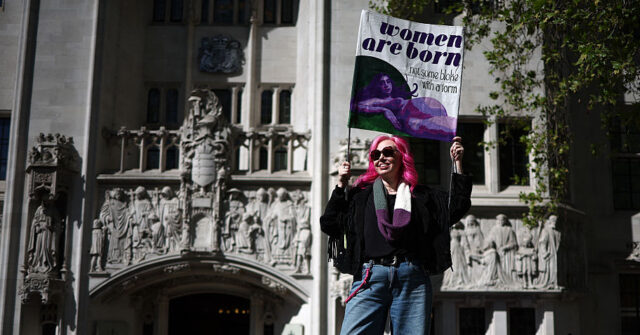The Supreme Court in London has ruled that, for the purposes of judging matters of equality, terms like ‘woman’ and ‘sex’ refer to biological sex, not gender.
Campaigners have hailed the “death” of self-identification as the UK Supreme Court in Westminster ruled on Wednesday morning that the UK’s Equality Act 2010 refers to “biological women and biological sex”.
The court has ruled: “The definition of sex in the Equality Act 2010 makes clear that the concept of sex is binary, a person is either a woman or a man.”
Judge Lord Patrick Hodge said in the ruling that the body of five judges had unanimously agreed that a man with a Gender Recognition Certificate, a UK legal paper that recognises that person’s assumed gender when it is other than their biological sex, could not be counted as a woman when it came to equality legislation.
As the court notes, this is pertinent to laws such as a 2018 Scottish law that moved to force gender equality on public bodies by mandating a 50-50 split between men and women on their boards. However as the law had been interpreted at times up to this ruling, a public body’s board could still be biologically totally male as long as half the members held Gender Recognition Certificates stating they were, in fact, women.
The Daily Telegraph cites the remarks of Maya Forstater, the chief executive of the gender critical Sex Matters group who proclaimed that the ruling means gender self-identification is “dead”. She said of the ruling: “They thanked us for our cogent argument. It has turned the Equality Act from confused to being clear.
“They looked at the whole argument, not just who goes in what bathroom and trans women. This is going to change organisations, employers, service providers. Everyone is going to have to pay attention to this, this is from the highest court in the land. It’s saying sex in the Equality Act is biological sex. Self ID is dead.”
Nevertheless, the ruling is not an attack on transgenderism itself, the court said, stating the equality act still gives very definite protections to transgender people. They said: “the Equality Act 2010 gives transgender people protection not only against discrimination through the protected characteristic of gender reassignment, but also against direct discrimination, indirect discrimination and harassment in their acquired gender.”
Lord Hodge said: “we counsel against reading this judgment as a triumph of one or more groups in our society at the expense of another, it is not.”
The Scottish Trans group urged its supporters not to panic in response to the verdict, reports The Guardian, who cite their words: “We’d urge people not to panic – there will be lots of commentary coming out quickly that is likely to deliberately overstate the impact that this decision is going to have on all trans people’s lives. We’ll say more as soon as we’re able to. Please look out for yourselves and each other today.”
Read the full article here


